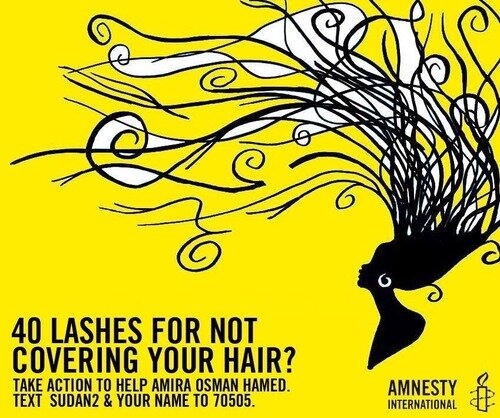
Sudanese are coming together to challenge Public Order Laws and stand behind Amira Osman Hamed. Ms. Osman Hamed, an engineer by training, has been charged with “dressing indecently or immorally,” for refusing to cover her hair. Sudanese groups, such as We Will Not Be Silenced, are using Ms. Osman's trial as an opportunity to shed light on similar violations of women’s human rights under Sudan’s Public Order Laws and calling on Sudanese citizens to demand the revision of these laws.
Following her hearing on November 4, 2013, Ms. Osman Hamed awaits the results of her prosecution. If found guilty, she could be sentenced with up to 40 lashes as punishment. Amira Osman Hamed recently said, “This case is not my own, it is a cause of all the Sudanese people who are being humiliated in their country, and their sisters, mothers, daughters, and colleagues are being flogged.” Flogging is a real threat in Sudan. A harrowing video from October shows a woman being lashed in the street by police for entering a car with a man who was not a family member.
Government figures from 2008 show that 43,000 women were arrested for clothing-related offenses in the capital alone. In 2002, Ms. Osman Hamed herself was arrested, charged, and convicted under Article 152 for wearing pants in public. While she paid the fine, thousands of women every year suffer the flogging punishment. Activists explain that Amira Osman's struggle is about more than women's rights. A spokesperson for Sudanese protest movement, Girifna elaborates, "it's really a socioeconomic thing too, because richer women can pay bail to avoid prison but not women from the periphery working in the informal economy.” Indeed, "too many Sudanese "women cannot pay the bail of $100-200, so they end up in prison for up to a month, and endure sexual assault from police officers."
In Sudan, these Public Order Laws, which carry harsh sentences of corporal punishment, were constructed in 1989 with the intent of creating an Islamic State. The laws, particularly Article 152, infiltrate every aspect of an individuals life. Article 152 of the Criminal Code of 1991 states,
“(1) Whoever commits, in a public place, an act, or conducts himself in an indecent manner, or a manner contrary to public morality, or wears an indecent, or immoral dress, which causes annoyance to public feelings, shall be punished, with whipping, not exceeding forty lashes, or with fine, or with both;
(2) The act shall be deemed contrary to public morality, if it is so considered in the religion of the doer, or the custom of the country where the act occurs."
While Sudan's Public Order Laws apply to both men and women, they disproportionately impact women. “Given continued discrimination and inequalities faced by women, including inferior roles attributed to them by patriarchal and traditional attitudes, and power imbalances in their relations with men, maintaining flogging as a form of punishment, even when it applies to both women and men, means in practice that women disproportionately face this cruel punishment, in violation of their human rights to dignity, privacy and equality,” said Frances Raday, the chairperson of the Working Group on the issue of discrimination against women in law and in practice.
Last February, Salmmah Women Resource Center and Open Mike organized One Billion Rising – Khartoum. Over a thousand women and men came together to perform the “Break the Chain” dance and stand up against violence. One Sudanese participant said, “All the women who participated, we all have a common understanding and personal commitment to get more people energized to end violence against women.”
Now, Amnesty International is leading a campaign to “Save Amira Osman Hamed from flogging in Sudan.” In addition, two United Nations independent experts have called on Sudan to release Amira Osman Hamed and to stop threatening women with flogging under the Criminal Code as this form of punishment is cruel, inhumane, and violates international law.Within Sudan, Khartoum Rising, We Will Not Be Silenced, and the actions of women like Ms. Osman Hamed are bringing attention to violence against women in Sudan.
We often hear about the challenges that Sudanese face in Darfur, Blue Nile, South Kordofan, Abyei and even Khartoum itself. However, Ms. Osman Hamed's bravery highlights a different side of the country. Her willingness to sacrifice her own safety to raise the profile of these Public Order Laws is inspiring. Now, other Sudanese are using social media to stand behind her, raise the profile of these restrictive laws and push back against their disproportionate impact on women's agency.

